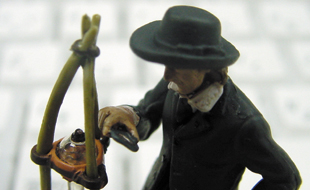The Embodiment of Jean-Henri Fabre
Back to Contents of Issue: October 2005
|
|
|
|
by Burritt Sabin |
|
 Descending the stairs to the bathroom in the stillness of night, I hear beetles tapping against the sides of the cages sitting in rows on a shelf above the toilet. I observe their burrowing and feasting on containers of a Jello-like aliment. They are magnificent creatures with smooth black carapaces and great headpieces. Not for nothing is one variety called the kabutomushi (helmet-head beetle) and the other the kuwagata mushi (hoe-head beetle).
Descending the stairs to the bathroom in the stillness of night, I hear beetles tapping against the sides of the cages sitting in rows on a shelf above the toilet. I observe their burrowing and feasting on containers of a Jello-like aliment. They are magnificent creatures with smooth black carapaces and great headpieces. Not for nothing is one variety called the kabutomushi (helmet-head beetle) and the other the kuwagata mushi (hoe-head beetle). The beetles are my son's. At his age I kept frogs, turtles, and even snakes but insects (except for fireflies) were outside my ken. In my boyhood the worth of amphibians and reptiles was self-evident as for him the value of beetles. Boys in Japan become amateur entomologists, poring over colorful field guides and embarking on beetle-hunting expeditions. Indeed the sight of a boy with a net in one hand and cage in the other scouring a copse for kabutomushi is part of the poetry of summer here. A favorite book of boys is Souvenirs Entomologiques (Entomological Memories), by Jean-Henri Fabre (1823-1915). Fabre wrote his magnum opus in ten volumes, the last appearing when he was 84. Late in life he gained fame, being elected to numerous societies and even receiving a visit from the president of France. Fabre was a self-taught natural scientist. His achievements lay not in his science per se but rather in his creation of the beau ideal of the entomologist. According to the Scarab Workers World Directory, "Fabre's works cannot be overemphasized because, quite apart from their popularizing influence, he alone set up the standards of observational patience and accuracy that subsequent workers were then obligated to match." Matching those standards presents a challenge. In order to observe insects, Fabre would crawl on his hands and knees, or remain in the same position in the same place for an entire day. He experienced what was perhaps his first epiphany in observation of insects while a 25-year-old teacher of physics on Corsica. As he observed the island's insects, he sensed everything they did was for the continued existence of the species, as if a hand were guiding them. He began to ponder instinct. He would later write: "Instinct is omniscient in the unchanging paths that have been laid down for it; away from those paths it knows nothing. Sublime inspirations of science, astounding inconsequences of stupidity, are alike its portion." He described the grub of the Capricorn beetle as "a bit of intestine that crawls about." However, he acknowledged that "this nothing-at-all is capable of marvelous acts of foresight; this belly, which knows hardly aught of the present, sees very clearly into the future." His inimitable literary style is a further reason to read him. In France, with the exception of men of letters and entomologists, few have heard of Fabre. That oft-used contemporary yardstick of recognition, Google, counts 5,670 web pages in French for Souvenirs Entomologiques and 227,000 pages for Konchuki, its title in Japanese. Perhaps there is no Japanese who has not heard of Fabre. Japanese grade schoolers know more of Souvenirs Entomologiques than do French adults. Their familiarity with the French scientist's life work is being exploited by Seven Eleven. The convenience store chain brought out this summer a Souvenirs Entomologiques series of limited edition gifts attached to the necks of soft drink bottles.. The series comprises eight pieces -- seven insects and a figurine of Fabre observing Minotaur beetles in a device of his invention. The kabutomushi remains a favorite of Japanese boys. What is the attraction? "The kabutomushi is big and strong and powerful looking," explained my son. "It's called the 'king of insects.' " Certainly his and his friends' interest in insects is fundamentally different from Fabre's. The scientist would with monomaniacal focus perform repeated experiments with insects, his intensity crystallized in the words, "If I ask questions that grasp essentials, nature will teach me everything I want to know." An interest in insects early in life is to be welcomed. It introduces children to natural history. It hones their powers of observation. It inculcates sympathy for other creatures and teaches the cycle of life. It leads children to Fabre. Fabre is one of a long line of men -- Lafcadio Hearn and Townsend Harris are two others -- largely forgotten at home but enshrined in the collective consciousness of the Japanese. This summer witnessed his embodiment. JI |
|
Note: The function "email this page" is currently not supported for this page.





